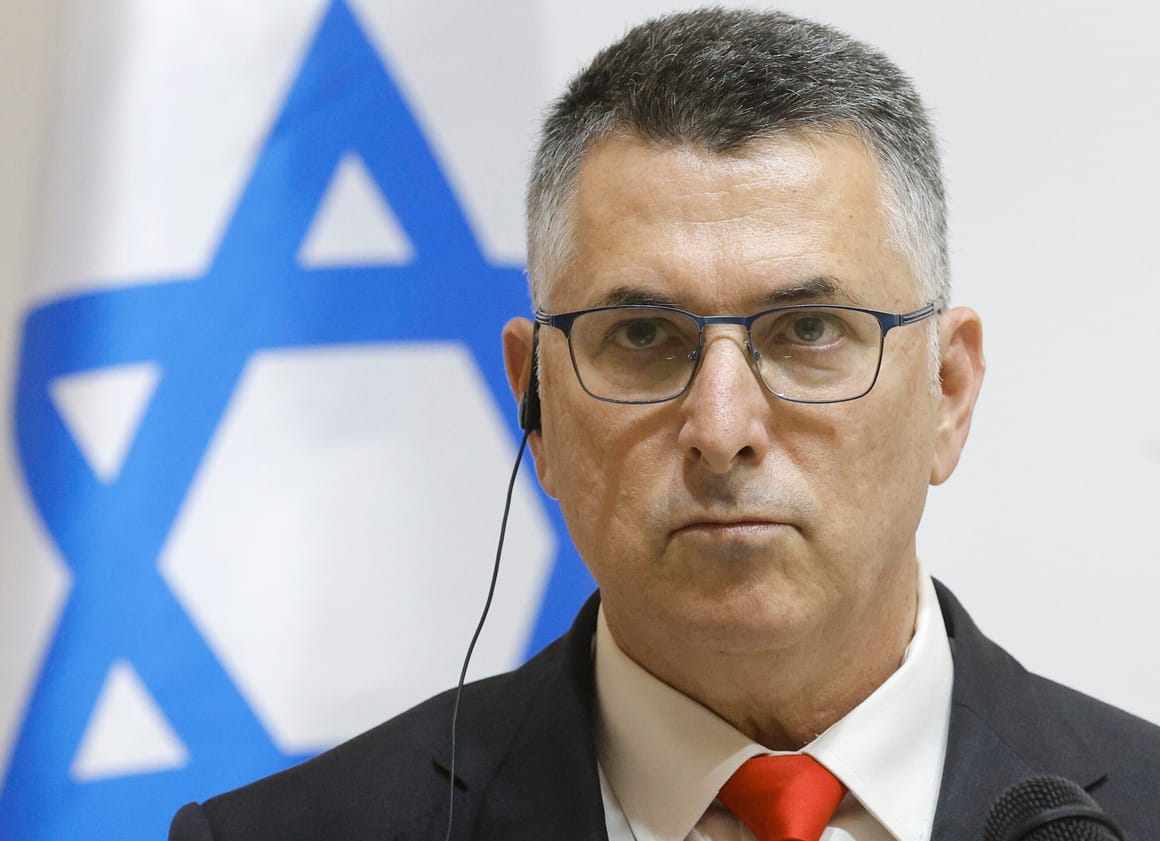Politics
Israel Blames UN for Gaza Aid Failures Amid Growing Starvation

Israel’s Foreign Minister, Gideon Sa’ar, has placed the blame for ongoing aid distribution failures in the Gaza Strip squarely on the United Nations. As starvation becomes increasingly prevalent in the territory, Sa’ar’s remarks have sparked a heated exchange with the international agency. In an interview with POLITICO, he stated that while Israel has opened additional crossing points and increased the flow of aid into Gaza under an agreement with the European Union, the UN has been ineffective in distributing the aid that is already available.
According to Sa’ar, there are over 900 truckloads of aid currently parked in a fenced-off area near the Kerem Shalom crossing point. “The problem is the U.N. is not distributing [aid],” he said, emphasizing the urgent need for action from the agency. This statement was made during a phone conversation from Ukraine, where he was meeting with President Volodymyr Zelenskyy about regional security issues, including Iran.
In response, the UN’s spokesperson, Stéphane Dujarric, firmly rejected Sa’ar’s claims, asserting that the situation is more complex than simply facilitating aid transport. “Kerem Shalom is not a McDonald’s drive-through where we just pull up and pick up what we’ve ordered,” Dujarric explained during a press briefing in New York. He highlighted significant bureaucratic and security obstacles that hinder the distribution of aid, suggesting that there is a lack of cooperation from Israeli authorities.
Adding to the complexity, officials from the European Union have indicated that Israel is not meeting its commitments regarding aid deliveries. Two EU diplomats reported that the number of trucks entering Gaza daily remains below the agreed threshold, contradicting Sa’ar’s assertions. A spokesperson for the UN Office for the Coordination of Humanitarian Affairs (OCHA) noted that their personnel face “immense bureaucratic challenges” in reaching and distributing humanitarian assistance.
Philippe Lazzarini, the commissioner general of the UN agency for Palestinian refugees (UNRWA), revealed that there are the equivalent of 6,000 loaded trucks of food and medical supplies waiting in Jordan and Egypt. He described a dire situation where “tonnes of food, clean water, medical supplies, shelter items and fuel sit untouched” due to humanitarian organizations being unable to access or deliver them.
Sa’ar dismissed accusations that Israel is obstructing aid distribution as “lies,” accusing the UN of operating with a mindset that aims to delegitimize Israel rather than genuinely assist the people of Gaza.
As the humanitarian crisis escalates, several European countries and top EU officials are increasing pressure on Israel to alleviate the starvation crisis and enhance aid efforts. The Gaza Health Ministry reported that as of October 19, 113 individuals, including 81 children, have succumbed to malnutrition since the onset of the conflict. In light of this, Ursula von der Leyen, President of the European Commission, called the images of suffering in Gaza “unbearable” and urged Israel to fulfill its aid commitments.
Media outlets, including Agence-France Presse, Associated Press, and the BBC, have echoed calls for Israel to allow more journalists into Gaza and facilitate the delivery of food, indicating that their correspondents also face starvation. The ongoing conflict has resulted in nearly 60,000 deaths in Gaza, as reported by local health officials, who do not differentiate between combatants and civilians.
On the diplomatic front, twelve days after the signing of an EU-Israel agreement regarding aid distribution, EU officials indicated that Israel has not adhered to the terms of the deal, a claim Sa’ar refuted. “All the things which are part of our understanding with the EU, we are implementing that,” he asserted, highlighting Israel’s efforts to open more crossings for humanitarian aid.
In a move to increase pressure on Israel, a coalition of ten countries, including France, has urged the European Commission to propose new measures. However, the success of these initiatives is uncertain due to opposition from Germany, Italy, Czechia, and Hungary, which hold a blocking minority in the European Council.
With no unified position from the EU, some member states have contemplated imposing their own sanctions. The bloc’s senior leaders have focused on advocating for a ceasefire. This aligns with the approach of U.S. President Donald Trump, who has dispatched negotiator Steve Witkoff to Rome for discussions involving Israeli Strategic Affairs Minister Ron Dermer and a Qatari official.
Sa’ar expressed Israel’s openness to “anything constructive” in terms of proposals for peace, although he lamented the absence of Hamas representatives at the talks. “We are there. They are not there,” he noted, underscoring the complexity of achieving a resolution amid the ongoing conflict.
-

 Top Stories3 months ago
Top Stories3 months agoTributes Surge for 9-Year-Old Leon Briody After Cancer Battle
-

 Entertainment4 months ago
Entertainment4 months agoAimee Osbourne Joins Family for Emotional Tribute to Ozzy
-

 Politics4 months ago
Politics4 months agoDanny Healy-Rae Considers Complaint After Altercation with Garda
-

 Top Stories4 months ago
Top Stories4 months agoIreland Enjoys Summer Heat as Hurricane Erin Approaches Atlantic
-

 World5 months ago
World5 months agoHawaii Commemorates 80 Years Since Hiroshima Bombing with Ceremony
-

 Top Stories3 months ago
Top Stories3 months agoNewcastle West Woman Patricia Foley Found Safe After Urgent Search
-

 Top Stories5 months ago
Top Stories5 months agoFianna Fáil TDs Urgently Consider Maire Geoghegan-Quinn for Presidency
-

 World5 months ago
World5 months agoCouple Convicted of Murdering Two-Year-Old Grandson in Wales
-

 World5 months ago
World5 months agoGaza Aid Distribution Tragedy: 20 Killed Amid Ongoing Violence
-

 World5 months ago
World5 months agoAristocrat Constance Marten and Partner Convicted of Infant Murder
-

 Top Stories4 months ago
Top Stories4 months agoClimbing Errigal: A Must-Do Summer Adventure in Donegal
-

 Top Stories4 months ago
Top Stories4 months agoHike Donegal’s Errigal Mountain NOW for Unforgettable Summer Views









